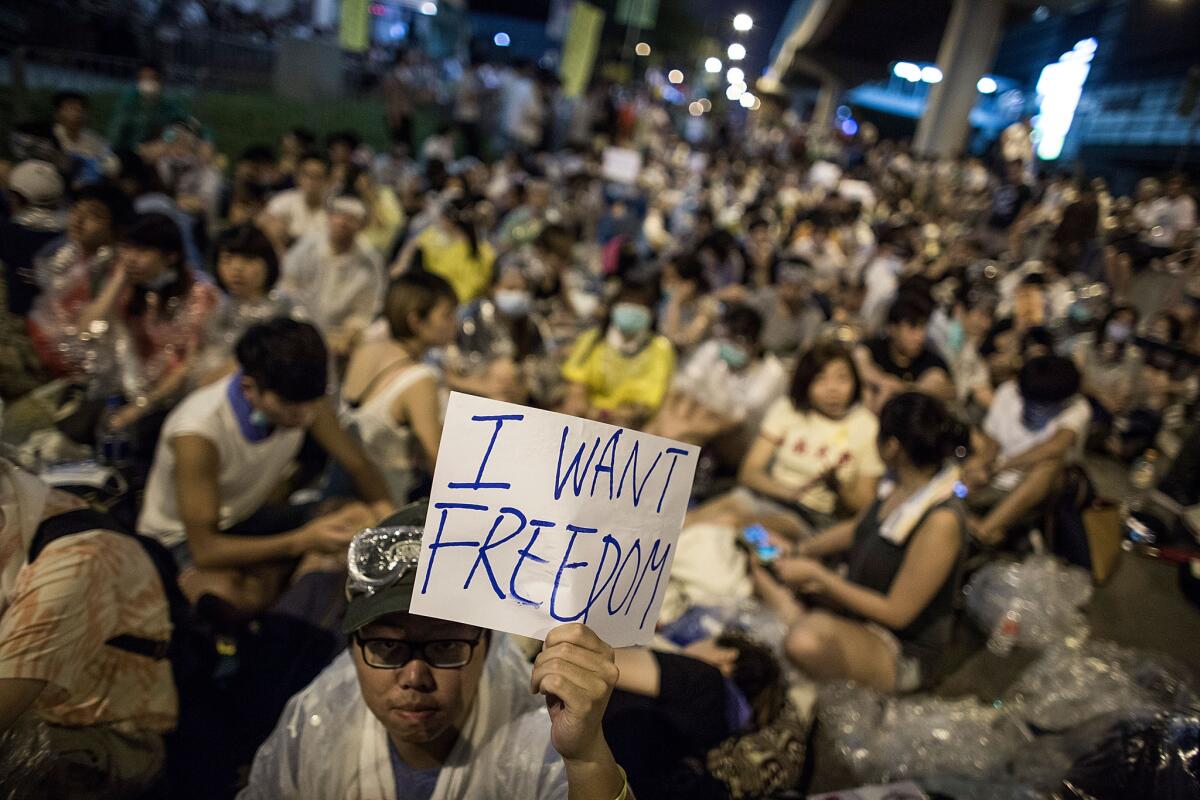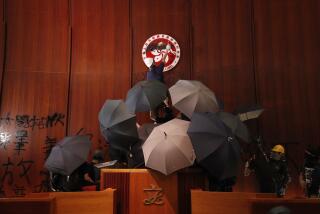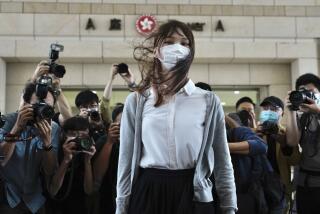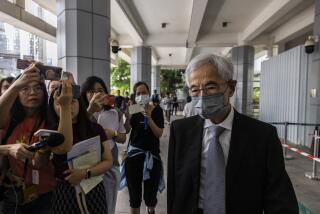Hong Kong police surround stragglers at Occupy Central protest

Police moved in early Sunday to surround the remnants of a pro-democracy demonstration as it morphed from a student-led protest into one spearheaded by the Occupy Central movement, which took its name and inspiration from the Occupy movement in the United States.
After the student-led protest drew tens of thousands of people to rally outside Hong Kong’s government offices Saturday night, Occupy Central launched its protest about 2 a.m. Sunday, only to see most of the crowd wither away before police made a show of force about 7 a.m.
By 8 a.m., officers had encircled the demonstrators but were not making any effort to physically remove them.
Authorities have said the Occupy Central campaign is illegal. Like the student-led protests, it is fighting new election rules for Hong Kong issued by mainland Chinese authorities.
Before the police moved in, Benny Tai, an Occupy Central organizer and Hong Kong University law professor, faced the rapidly shrinking crowd and said, “We’ll still try to defend our position here against any action by the police and then move on to where we want to be, Central,” referring to Hong Kong’s financial district.
Saturday marked the second night of the standoff between Hong Kong police and democracy activists, who occupied a public plaza at the Chinese territory’s main government compound, despite repeated attempts by officers to disperse the growing crowd. More than 70 people, most of them university and high school students, were arrested in the first two days.
As midnight approached Saturday, thousands were massed in and around the complex. The move to occupy the plaza came after thousands of university students skipped classes last week to protest election guidelines issued by mainland Chinese government authorities for Hong Kong’s 2017 elections.
Demonstrators say the rules will prevent a truly free and fair election for Hong Kong’s chief executive, the highest office in the semiautonomous territory that was a British colony until 1997.
Among those arrested Saturday was a feisty local lawmaker, Leung Kwok-hung, a.k.a. Longhair. He and dozens of others were detained after 17-year-old protest leader Joshua Wong, the diminutive but passionate head of a high-school activist group, Scholarism, was dragged off by four officers Friday night.
Joshua was reportedly denied bail and remained in detention while police searched his bedroom in the apartment he shares with his parents, Grace and Roger Wong. The couple issued a statement saying, “We can therefore only conclude that the decision to continue to detain him is a political one and that this [is] in fact political persecution.”
When Sunday dawned, many students had left, with their leaders in police detention. No more than a couple thousand activists remained. But Tai said the two student groups, the Hong Kong Federation of Students and Scholarism, had signed on to his campaign.
Tension over the 2017 vote has been building for months in Hong Kong, which returned to Chinese sovereignty under a framework known as “one country, two systems.” The territory’s 7 million citizens enjoy significantly greater civil liberties than their counterparts in Communist-run mainland China.
Local lawmakers must ratify the final 2017 election rules. Those protesting this weekend are seeking to encourage legislators to reject the framework put forth by Beijing or somehow modify it.
Although Chinese authorities have approved the idea of allowing all Hong Kong citizens to cast ballots for chief executive — rather than just a 1,200 member committee — protesters say limits on who can run will ensure that only candidates Beijing approves of will be allowed in the race.
The Occupy movement — its full name is Occupy Central With Love and Peace — has been planning a sit-in Wednesday in the city’s financial hub, known as Central. The date is a national holiday marking the 1949 founding of Communist-led China.
Hong Kong has seen much bigger rallies, marches and demonstrations in recent years, some attracting hundreds of thousands of people, but the standoff this weekend was notable for its rancor and the use of force by police. In general, Hong Kong protests tend to be disciplined and orderly.
Between tense episodes of police pressing into protesters with metal barricades, pockets of supporters occasionally broke into chants to voice their demands.
“The students are innocent. The students are innocent.”
“Officers, back off! Back off! Back off!”
The crowd was largely young, but many older citizens joined in, with some saying they now see the city’s political future in the students’ hands, while bemoaning the lack of a larger turnout.
Gary Chan, a 51-year-old investment manager, said he came alone because most of his friends don’t care about elections. “I asked them: ‘Why don’t you care about your own city?’” he said.
Yet, scenes of police in riot gear using pepper spray and batons on unarmed students and activists appeared to motivate sympathetic Hong Kongers to turn out at government headquarters Saturday. Supporters came bearing food, bottled water and medical equipment, with supplies piling up on the sidewalks.
In a statement issued Saturday, the Hong Kong police said officers “respect the public’s freedoms of expression, speech and assembly.”
But three pro-Beijing political parties in Hong Kong issued a joint statement condemning the students’ actions as illegal.
Despite all this, Eric Chong, researcher on local student movements at the Hong Kong Institute of Education, predicted the string of mass movements “sure will erode the government’s legitimacy because the public sees it as maintaining its rule by sheer force.”
Law is a special correspondent.
More to Read
Start your day right
Sign up for Essential California for news, features and recommendations from the L.A. Times and beyond in your inbox six days a week.
You may occasionally receive promotional content from the Los Angeles Times.






